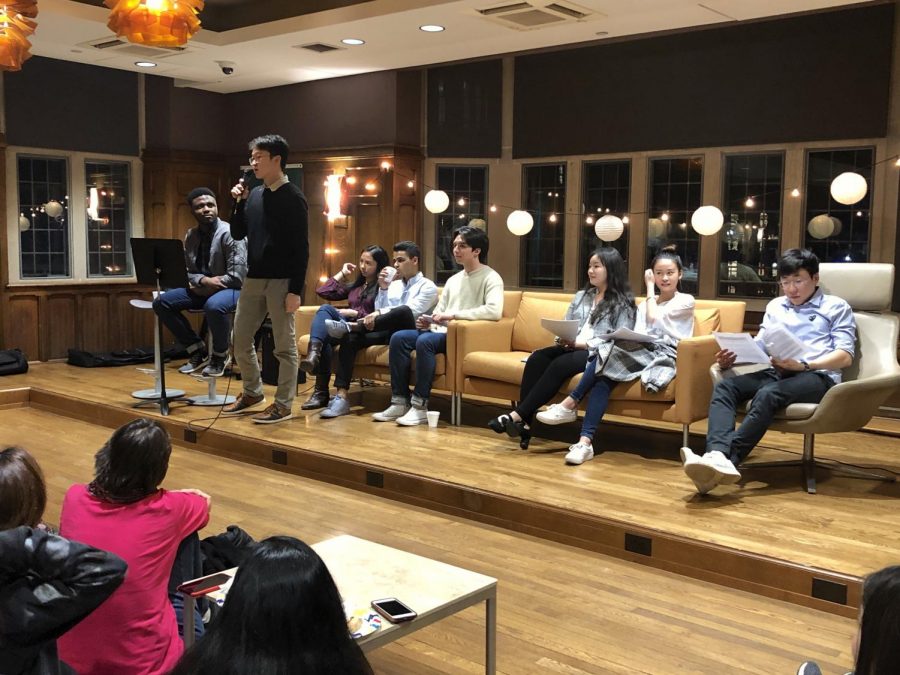This February, I attended an incredible event called “Lanterns” hosted by the Multicultural Leadership Council. The event involved a panel of international students sharing their stories of transitioning to life in the United States and Vanderbilt to a room full of students. The event was registered as a Greek Member Experience and, thus, many Greek students chose to attend. I will not pretend to understand each student’s motivation for attending the event, but after about 30 minutes, it became apparent that not everyone was there simply to better understand their international peers. At this event, like so many others, a mass exodus of Greek students occurred soon after the event had started. Shortly thereafter, I heard one international student, who was not a member of Greek life, explain to her friend, also non-Greek, that these individuals were “just here to get the swipe.”
The “Greek Member Experience,” or GME, has two goals: to create an opportunity for Vanderbilt students to undergo “individual member development” and to serve as a tool for the Office of Greek Life to “demonstrate the commitment of Greek organizations to be leaders within the Vanderbilt community.” The program consists of attendance requirements in six required tracks: Campus Involvement, Community Impact, Diversity & Inclusion, Faculty Engagement, Healthy Behaviors and Personal Development. OGL freely admits, however, that one of the primary motivations for the establishment of GME requirements is to allow the Vanderbilt administration to “explicitly demonstrate to faculty, staff, prospective members, alumni and parents” the engagement of Greek life members. While I recognize that an institution of higher learning like Vanderbilt should remain cognizant of outside entities like prospective members, the GME program should be implemented with the current students it affects as the foremost concern.
The idea that negative incentivization, in the form of punishments, will encourage individuals to find their passion and pursue meaningful opportunities on campus is ill-considered.
The GME program creates problems within the Vanderbilt community in three ways: misalignment of goals and incentives, lack of recognition of unique individual involvements and apathy.
First, the misalignment of goals and incentives is easily visible in the way in which GME requirements are laid out. Individual chapters are required to meet minimum levels of involvement in each of the six GME tracks for quarterly “checkpoints.” Otherwise, offending chapters face various punishments, which include an automatic four-week social suspension for failing to meet year-end requirements. As of April 11, 63 percent of Greek organizations are facing this punishment according to the Office of Greek Life. The idea that negative incentivization, in the form of punishments, will encourage individuals to find their passion and pursue meaningful opportunities on campus is ill-considered. A direct result of this misalignment of incentives is the Greek community’s (admittedly earned) reputation for “swipe-and-leave” activity at GME events.
With a stated goal of fostering positive involvement from Greek life members, OGL should create positive incentives like scholarships and other forms of recognition and Greek house improvements for accomplishments within the community. These sorts of incentives would more appropriately align with the stated purpose of individual development that OGL has prescribed to the GME program.
It is interesting to compare GME with the similar, but voluntary, “Design Your VU” program (formerly known as “My Vanderbilt Experience”) that non-Greek (and some Greek) first-year students participate in. “Design Your VU” offers completion rewards including prizes and recognition at an annual leadership ceremony. GME, on the other hand, offers students no such reward, instead offering individual and chapter punishments for failing to meet GME checkpoints. Perhaps the knowledge acquired from a variety of eye-opening experiences is the true reward students should be receiving from each program they participate in, but the mandatory and penalty-driven GME program hardly promotes this form of learning.
the GME system creates apathy among those it is forced upon and anger among those who must deal with apathetic individuals arriving at their events.
Second, the lack of individualization of GME creates myriad problems for chronically overwhelmed students. For example, one of my involvements on campus is with the Greek Inclusivity Alliance (GIA), an organization that meets weekly to discuss issues of diversity and inclusion within the Greek community. You may have noticed that the topic of discussion this organization focuses on mirrors one of the GME tracks. Therefore, it would stand to reason that this organization would “check the box” for this track. However, this is not the way that GME works, and this represents one of the problems that the designers of the GME program must have grappled with: how to measure the totality of a student’s involvement and development. In an ideal world, students would participate in organizations like GIA and attend many other events to eliminate this problem. But, in my experience, this is much easier said than done for students who constantly struggle to manage their time. I am a believer that GME can operate beneficially for our community. But the current GME system misses the mark by undervaluing a student’s involvement on campus.
Third, and as a result of the above points, the GME system creates apathy among those it is forced upon and anger among those who must deal with apathetic individuals arriving at their events. For the members of the MLC who spent their valuable time and energy planning and attending the “Lanterns” event, GME presents a dilemma: it draws attendees who may not normally attend an event, but it also creates resentment when those same individuals interrupt and disrespect events.
Druv Vohra, a leader in the MLC, stated that the behavior of students who swipe and leave at cross cultural events “discourages non-Greek students.” These students justifiably question whether Greek students are “challenging themselves to understand other cultures in the same way that non-Greek students and people of color do when encountering Greek culture.” It is possible that the GME program creates a system wherein events self-segregate into groups who are just “there for the swipe” and individuals who care deeply about the issues at hand. Perhaps my perspective as a member of Greek life is limiting, but through conversations with leaders of the MLC, I have found these issues to be commonly felt within both Greek and non-Greek communities.
I recognize that OGL has already attempted to use student feedback to improve the GME program, which is only in its third year. However, these changes are nowhere near sufficient; for example, the recent implementation of a “Personal Reflection” form for Greek students to submit to receive credit for a non-registered event may make sense to administrators in a boardroom, but the actual proportion of students who are going to sit down to write a 350 to 750-word reflection on an event is minimal. Vanderbilt lacks the necessary forum for the 40 percent of students who participate in Greek life to express their views on the positive and negative aspects of the GME program that alters their Vanderbilt experience. Such an influential program deserves more than a footnote in the Chapter Presidents’ meeting. Vanderbilt administration must look beyond the influence that the data-driven GME program may have on its ability to sell Greek life as a positive institution to future students and focus its attention on better serving the more than 2,000 students the GME program currently affects. The OGL should welcome Greek leaders and non-Greek organizations affected by the GME program to discuss improvements to the current system, otherwise, the Vanderbilt community risks entrenching the negative effects of GME.
Grant Brown is a sophomore in Peabody College. He can be reached at [email protected].













